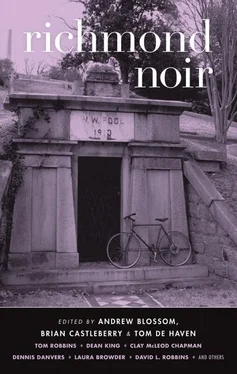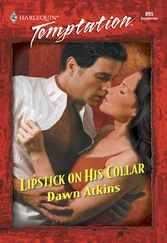X. Atkins - Richmond Noir
Здесь есть возможность читать онлайн «X. Atkins - Richmond Noir» весь текст электронной книги совершенно бесплатно (целиком полную версию без сокращений). В некоторых случаях можно слушать аудио, скачать через торрент в формате fb2 и присутствует краткое содержание. Город: New York, Год выпуска: 2010, ISBN: 2010, Издательство: Akashic Books, Жанр: Детектив, на английском языке. Описание произведения, (предисловие) а так же отзывы посетителей доступны на портале библиотеки ЛибКат.
- Название:Richmond Noir
- Автор:
- Издательство:Akashic Books
- Жанр:
- Год:2010
- Город:New York
- ISBN:978-1-933354-98-9
- Рейтинг книги:4 / 5. Голосов: 1
-
Избранное:Добавить в избранное
- Отзывы:
-
Ваша оценка:
- 80
- 1
- 2
- 3
- 4
- 5
Richmond Noir: краткое содержание, описание и аннотация
Предлагаем к чтению аннотацию, описание, краткое содержание или предисловие (зависит от того, что написал сам автор книги «Richmond Noir»). Если вы не нашли необходимую информацию о книге — напишите в комментариях, мы постараемся отыскать её.
Richmond Noir — читать онлайн бесплатно полную книгу (весь текст) целиком
Ниже представлен текст книги, разбитый по страницам. Система сохранения места последней прочитанной страницы, позволяет с удобством читать онлайн бесплатно книгу «Richmond Noir», без необходимости каждый раз заново искать на чём Вы остановились. Поставьте закладку, и сможете в любой момент перейти на страницу, на которой закончили чтение.
Интервал:
Закладка:
In the Eagle, just down from Shockoe Hill, the din of pressmen, gentlemen farmers, lawmakers, slave traders, merchants, and unattached ladies was considerable. Their prosperous city of 6,000 souls had recently received its first bank charter, and a public library had opened. Their talk ranged from the price of tobacco leaf and the prospects of rain to the European war, but most of all to the trial being presided over by Chief Justice John Marshall and of particular interest to President Jefferson.
The General was a player in the drama. Prior to his exploits in North Africa, he had entertained a proposal from Burr involving the territories stretching west of the Mississippi and down into Mexico. The scheme — to hew a new kingdom out of this wilderness — had collapsed, and now the General was called to bear witness against Burr on charges of treason.
The General had testified that day. As he sat in the stand, a military hero, in a place, at last, where that seemed to matter, his luster had returned. That evening, when he took his seat at a gaming table in the Eagle, he felt fresh again, his battered confidence restored.
Across from the General, the gentleman from Shirley Plantation, a broad raw-boned man who was the largest property owner and slaveholder in the state, dealt, his massive fingers barely able to distinguish the cards. To the General’s left sat the principal of Southside Plantation, a man whose bald forehead was speckled red by the sun and whose teeth approached in color his few strands of brown hair. To the General’s right, a legislator from Maryland, a smart silver chain dangling from the fob of his waistcoat, observed the table with darting eyes.
“So you were the hero of Derna?” the legislator asked rhetorically, looking at his hand, an eyebrow raised. The General, still in possession of his instincts, instantly sensed this man to be a threat.
“The Marines were instrumental,” he replied, not looking up. “But it was my notion, so I received the shiny medal to show for it.” Any man who read the newspapers knew that he had, in fact, orchestrated the coup of a particularly inimical pasha, recruiting an army of cutthroats in Egypt, marching across Libya, and taking the Mediterranean port. The sudden and extraordinary blow had shocked the piratical Barbary dictators, who had immediately treated for peace. The General had effectively won the Barbary War.
“I raise a glass to you, sir,” said the Shirley man, with earnest admiration.
The others raised theirs, filled with Thorp’s corn liquor — bourbon — invented by an Episcopal priest at Berkeley, well before Kentucky was chipped off her mother state. “The Gen’ral,” they said.
The General neither smiled nor reacted. The twirl of a dress in the glint of lantern light had caught his eye. His mind leaped the sea. The pasha’s older brother, the rightful ruler of Derna, whom the General had found in Egypt and installed in place of his usurping younger sibling, had just as quickly been abandoned by the U.S. government, deposed, and beheaded. The General had used his persuasive arts to induce the man to risk his life in the cause of another man’s nation. Then he had walked out on him at the insistence of that nation. A lifelong soldier, the General still struggled to swallow his indignation. Though outwardly sure, he had come to despise himself.
The General laid down knaves over deuces, a lady high. Looking away, he gathered in the pot as if it meant nothing. He was a virtual chameleon when he wanted to be — having once, it was sworn to by good and sober U.S. Army officers, learned a certain Indian language, stained his skin to infiltrate the tribe’s village, and returned with intelligence that caused its destruction.
The General’s aide-de-camp sat in a dark corner.
“Do you know what they’d do to you?” Rosy O’Sharon said, when his eyes met hers.
“I am not a black man,” he countered in his bass voice. “My name is Mustafa. I am an Arab.” Rose’s head tilted a notch. He was tall, over six feet, square-shouldered, café au lait.
“Liar,” she spat. “A-rabs don’t drink.”
“They do not dwell in the devil’s lair either,” he responded flatly, eyeing the Marylander, who he noted wore a blade in his boot and a carefully concealed shoulder holster.
“Well, I seen slaves lighter’n you, doll,” she warmed, “but none as handsome.”
Mustafa watched her feet as she walked away. “Can you dance?” he called to her.
“I’m Irish,” she answered.
“Can your friends?”
The youngest brother of the feuding pashas, Mustafa had crossed Libya with the General and fought at Derna in his ragtag army, which numbered a dozen Americans, forty-odd Greeks and Italians, and some five hundred Turks, Mamluks, and Arabs. When the General requested that Mustafa continue in his personal employ, he had considered it an honor.
The General returned to the U.S. to great fanfare. In Washington, Mustafa had stood proudly in the background in his flowing white haik and a black turban. He took in his new country with glowing eyes, as he would a sumptuous meal of camel.
In New England, the General’s wife, however, received his two aides-de-camp — one Arab, one Italian — coolly. “William, with all due respect to your men,” she had stated, “they shall bed down elsewhere.”
“But, my darling, I need them nearby,” the General insisted, though with nothing of his usual force. “Gilo is a superb amanuensis. You can use his services.”
“That may be so, but they will be comfortable enough in the barn.”
As the weeks wore on, the two men had begun to realize that the daring leader they knew in Libya was not the same in this cold place. Over time, as the General’s plans stalled, the Arab and the Italian came to despise one another Gilo mostly smoked and sneered. Mustafa furtively courted the servant of a neighboring farm, meeting her at night in the woods to soothe her fears with cold fingers.
“You will only ruin her,” Gilo had chastised Mustafa.
When the General’s wife asked her husband to leave, Mustafa found that Gilo had been right about the girl. It wounded him far more than she knew when he revealed that he was leaving, far more than the elbow she delivered to his jaw, which chipped a tooth.
Gilo had found ways to twist the knife. “I won’t be missing nothing here. How about you, Mufti?” he prodded as they set out with the General. “No, this place is like a punch in the mouth.” When they reached New York City, Gilo, who served as the General’s purser, deserted them, taking along a good deal of the General’s cash.
A man with two tankards in his hands teetered up to the card game. “You shoulda seen the Gen’l today,” he crowed, slamming a pint down and sloshing it on the table. “For you, sir, a real hero, not one of them quill scratchers. Damn fine testimony today.” The Hall of the House of Delegates had been filled to capacity. The prosecution’s first witness, the General had slipped back into character, a field commander again, not to be toyed with by legal men. He described a conversation with Burr in Washington during the winter of ’05–’06. “I listened to Colonel Burr’s mode of indemnity,” he declared, “and as I had by this time begun to suspect that the expedition he had afoot was unlawful, I permitted him to believe myself resigned to his influence that I might understand the extent and motive of his arrangements.” The General, who had admired the scale of the former vice president’s ambition, if little else, paused for effect. “Colonel Burr laid open his project of revolutionizing the territory west of the Allegheny, establishing an independent empire there; New Orleans to be the capital, and he himself to be the chief.” The courtroom had been transfixed.
Читать дальшеИнтервал:
Закладка:
Похожие книги на «Richmond Noir»
Представляем Вашему вниманию похожие книги на «Richmond Noir» списком для выбора. Мы отобрали схожую по названию и смыслу литературу в надежде предоставить читателям больше вариантов отыскать новые, интересные, ещё непрочитанные произведения.
Обсуждение, отзывы о книге «Richmond Noir» и просто собственные мнения читателей. Оставьте ваши комментарии, напишите, что Вы думаете о произведении, его смысле или главных героях. Укажите что конкретно понравилось, а что нет, и почему Вы так считаете.












